Understanding Contemporary Tourism: Factors and Impacts Analysis
VerifiedAdded on 2023/06/09
|8
|2409
|265
Essay
AI Summary
This essay delves into the multifaceted world of contemporary tourism, defining it as the movement of individuals for pleasure and recreation, significantly contributing to the global economy. It examines the tourism industry's various components, including transportation, hospitality, and destination planning, highlighting its evolution and global importance. The essay explores the economic, environmental, socio-cultural, technological, and legal factors influencing tourism, analyzing their positive and negative impacts. It addresses challenges like changing consumer expectations, technological advancements, and the COVID-19 pandemic's effects. The economic factors discussed include revenue generation, infrastructure development, and employment opportunities, as well as negative impacts such as the concentration of tourist spending in specific areas. Environmental considerations encompass resource utilization, pollution, and the preservation of ecology. Socio-cultural aspects cover cultural exchange, the impact on family structures, and the potential for social issues like exploitation. The essay concludes by emphasizing the importance of sustainable practices and effective government policies to mitigate negative impacts and ensure the industry's future.
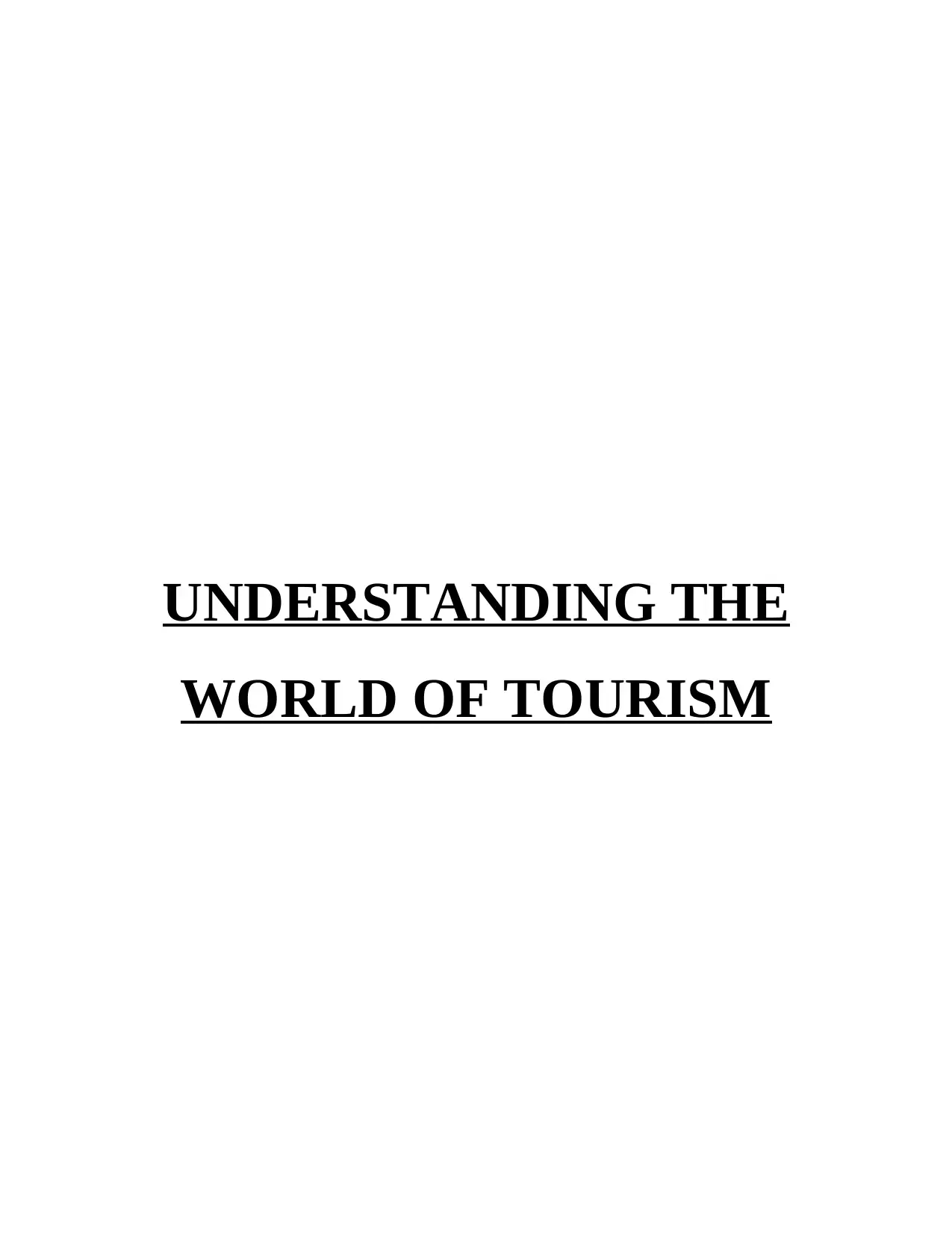
UNDERSTANDING THE
WORLD OF TOURISM
WORLD OF TOURISM
Paraphrase This Document
Need a fresh take? Get an instant paraphrase of this document with our AI Paraphraser

Table of Contents.
REFERENCES................................................................................................................................7
REFERENCES................................................................................................................................7
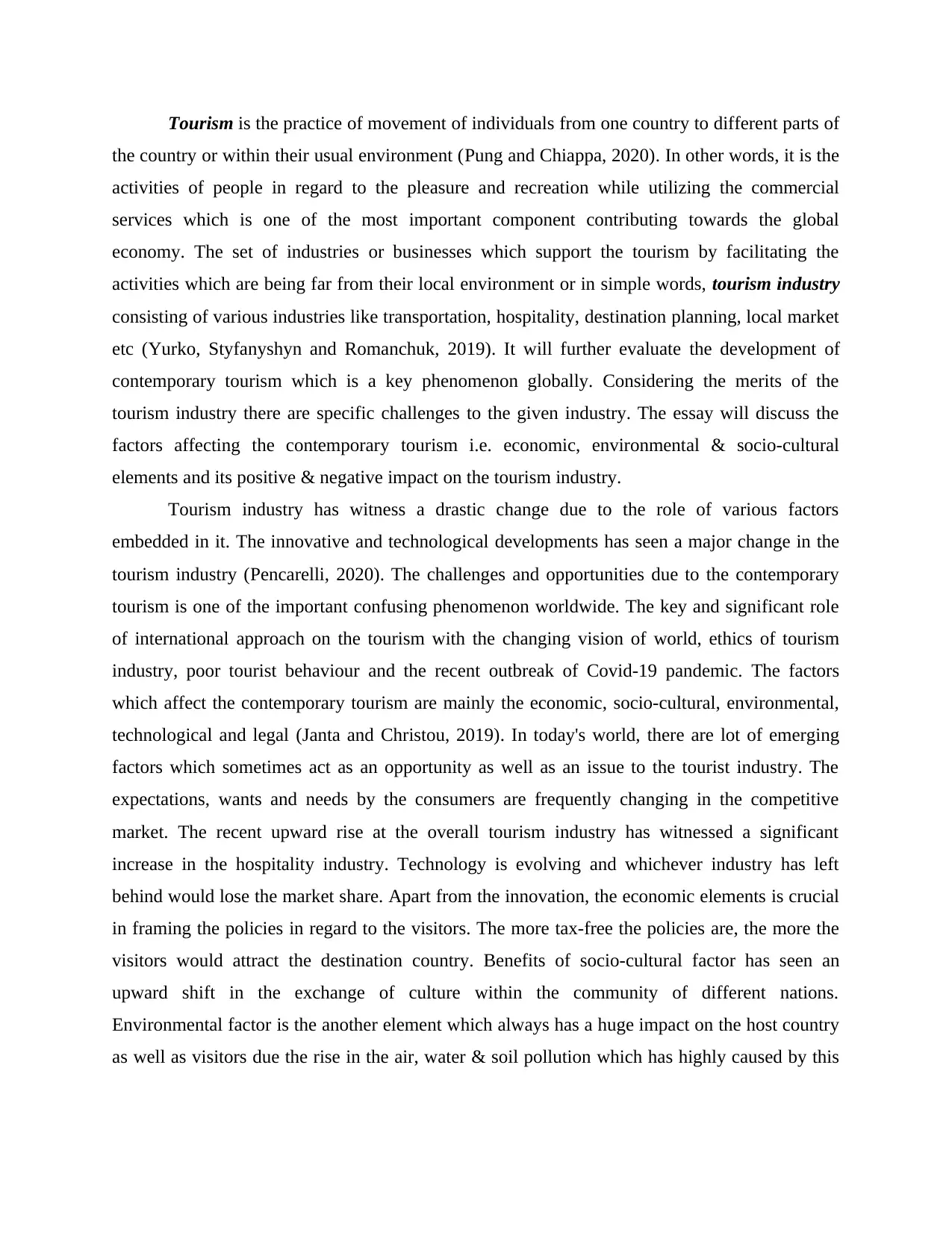
Tourism is the practice of movement of individuals from one country to different parts of
the country or within their usual environment (Pung and Chiappa, 2020). In other words, it is the
activities of people in regard to the pleasure and recreation while utilizing the commercial
services which is one of the most important component contributing towards the global
economy. The set of industries or businesses which support the tourism by facilitating the
activities which are being far from their local environment or in simple words, tourism industry
consisting of various industries like transportation, hospitality, destination planning, local market
etc (Yurko, Styfanyshyn and Romanchuk, 2019). It will further evaluate the development of
contemporary tourism which is a key phenomenon globally. Considering the merits of the
tourism industry there are specific challenges to the given industry. The essay will discuss the
factors affecting the contemporary tourism i.e. economic, environmental & socio-cultural
elements and its positive & negative impact on the tourism industry.
Tourism industry has witness a drastic change due to the role of various factors
embedded in it. The innovative and technological developments has seen a major change in the
tourism industry (Pencarelli, 2020). The challenges and opportunities due to the contemporary
tourism is one of the important confusing phenomenon worldwide. The key and significant role
of international approach on the tourism with the changing vision of world, ethics of tourism
industry, poor tourist behaviour and the recent outbreak of Covid-19 pandemic. The factors
which affect the contemporary tourism are mainly the economic, socio-cultural, environmental,
technological and legal (Janta and Christou, 2019). In today's world, there are lot of emerging
factors which sometimes act as an opportunity as well as an issue to the tourist industry. The
expectations, wants and needs by the consumers are frequently changing in the competitive
market. The recent upward rise at the overall tourism industry has witnessed a significant
increase in the hospitality industry. Technology is evolving and whichever industry has left
behind would lose the market share. Apart from the innovation, the economic elements is crucial
in framing the policies in regard to the visitors. The more tax-free the policies are, the more the
visitors would attract the destination country. Benefits of socio-cultural factor has seen an
upward shift in the exchange of culture within the community of different nations.
Environmental factor is the another element which always has a huge impact on the host country
as well as visitors due the rise in the air, water & soil pollution which has highly caused by this
the country or within their usual environment (Pung and Chiappa, 2020). In other words, it is the
activities of people in regard to the pleasure and recreation while utilizing the commercial
services which is one of the most important component contributing towards the global
economy. The set of industries or businesses which support the tourism by facilitating the
activities which are being far from their local environment or in simple words, tourism industry
consisting of various industries like transportation, hospitality, destination planning, local market
etc (Yurko, Styfanyshyn and Romanchuk, 2019). It will further evaluate the development of
contemporary tourism which is a key phenomenon globally. Considering the merits of the
tourism industry there are specific challenges to the given industry. The essay will discuss the
factors affecting the contemporary tourism i.e. economic, environmental & socio-cultural
elements and its positive & negative impact on the tourism industry.
Tourism industry has witness a drastic change due to the role of various factors
embedded in it. The innovative and technological developments has seen a major change in the
tourism industry (Pencarelli, 2020). The challenges and opportunities due to the contemporary
tourism is one of the important confusing phenomenon worldwide. The key and significant role
of international approach on the tourism with the changing vision of world, ethics of tourism
industry, poor tourist behaviour and the recent outbreak of Covid-19 pandemic. The factors
which affect the contemporary tourism are mainly the economic, socio-cultural, environmental,
technological and legal (Janta and Christou, 2019). In today's world, there are lot of emerging
factors which sometimes act as an opportunity as well as an issue to the tourist industry. The
expectations, wants and needs by the consumers are frequently changing in the competitive
market. The recent upward rise at the overall tourism industry has witnessed a significant
increase in the hospitality industry. Technology is evolving and whichever industry has left
behind would lose the market share. Apart from the innovation, the economic elements is crucial
in framing the policies in regard to the visitors. The more tax-free the policies are, the more the
visitors would attract the destination country. Benefits of socio-cultural factor has seen an
upward shift in the exchange of culture within the community of different nations.
Environmental factor is the another element which always has a huge impact on the host country
as well as visitors due the rise in the air, water & soil pollution which has highly caused by this
⊘ This is a preview!⊘
Do you want full access?
Subscribe today to unlock all pages.

Trusted by 1+ million students worldwide
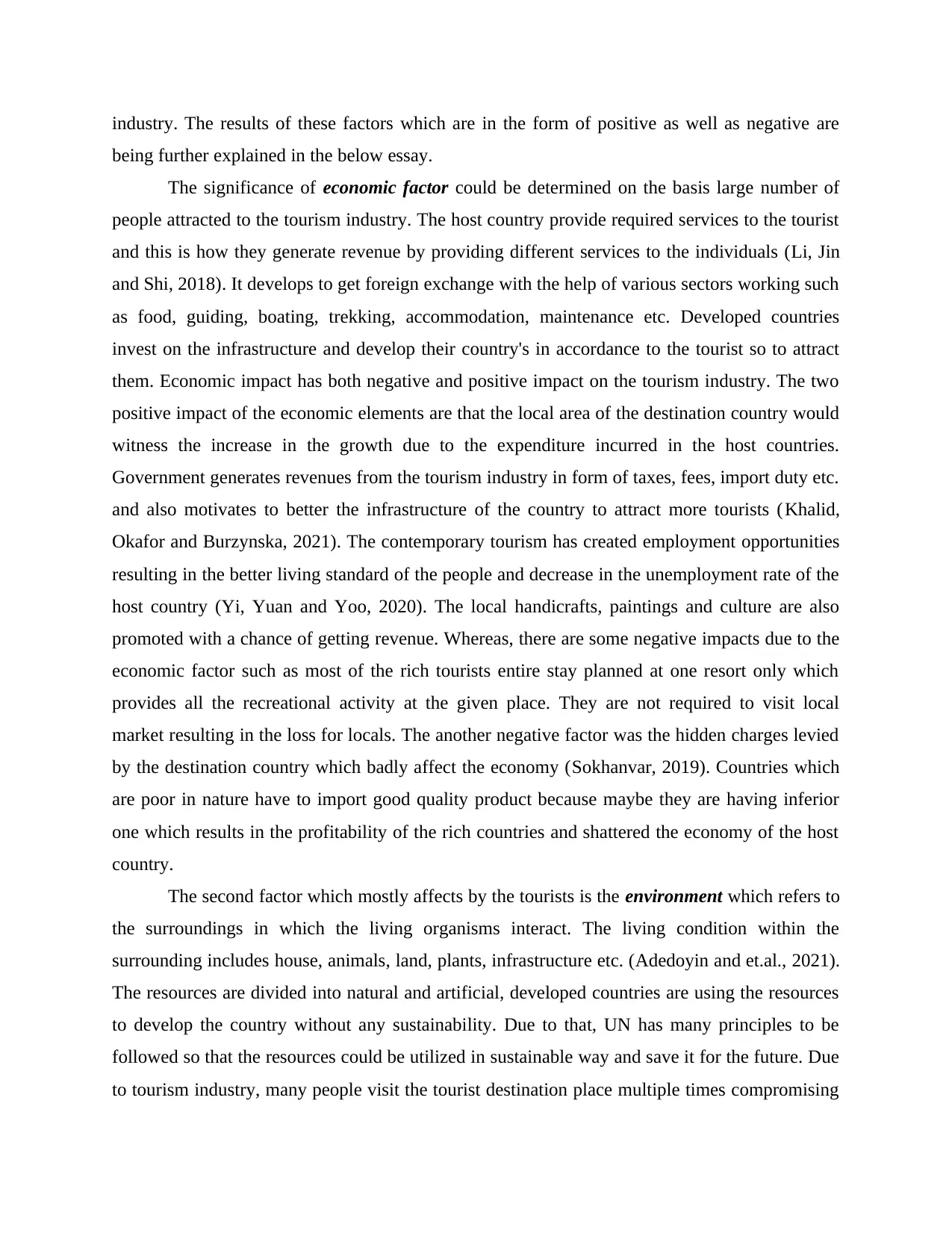
industry. The results of these factors which are in the form of positive as well as negative are
being further explained in the below essay.
The significance of economic factor could be determined on the basis large number of
people attracted to the tourism industry. The host country provide required services to the tourist
and this is how they generate revenue by providing different services to the individuals (Li, Jin
and Shi, 2018). It develops to get foreign exchange with the help of various sectors working such
as food, guiding, boating, trekking, accommodation, maintenance etc. Developed countries
invest on the infrastructure and develop their country's in accordance to the tourist so to attract
them. Economic impact has both negative and positive impact on the tourism industry. The two
positive impact of the economic elements are that the local area of the destination country would
witness the increase in the growth due to the expenditure incurred in the host countries.
Government generates revenues from the tourism industry in form of taxes, fees, import duty etc.
and also motivates to better the infrastructure of the country to attract more tourists (Khalid,
Okafor and Burzynska, 2021). The contemporary tourism has created employment opportunities
resulting in the better living standard of the people and decrease in the unemployment rate of the
host country (Yi, Yuan and Yoo, 2020). The local handicrafts, paintings and culture are also
promoted with a chance of getting revenue. Whereas, there are some negative impacts due to the
economic factor such as most of the rich tourists entire stay planned at one resort only which
provides all the recreational activity at the given place. They are not required to visit local
market resulting in the loss for locals. The another negative factor was the hidden charges levied
by the destination country which badly affect the economy (Sokhanvar, 2019). Countries which
are poor in nature have to import good quality product because maybe they are having inferior
one which results in the profitability of the rich countries and shattered the economy of the host
country.
The second factor which mostly affects by the tourists is the environment which refers to
the surroundings in which the living organisms interact. The living condition within the
surrounding includes house, animals, land, plants, infrastructure etc. (Adedoyin and et.al., 2021).
The resources are divided into natural and artificial, developed countries are using the resources
to develop the country without any sustainability. Due to that, UN has many principles to be
followed so that the resources could be utilized in sustainable way and save it for the future. Due
to tourism industry, many people visit the tourist destination place multiple times compromising
being further explained in the below essay.
The significance of economic factor could be determined on the basis large number of
people attracted to the tourism industry. The host country provide required services to the tourist
and this is how they generate revenue by providing different services to the individuals (Li, Jin
and Shi, 2018). It develops to get foreign exchange with the help of various sectors working such
as food, guiding, boating, trekking, accommodation, maintenance etc. Developed countries
invest on the infrastructure and develop their country's in accordance to the tourist so to attract
them. Economic impact has both negative and positive impact on the tourism industry. The two
positive impact of the economic elements are that the local area of the destination country would
witness the increase in the growth due to the expenditure incurred in the host countries.
Government generates revenues from the tourism industry in form of taxes, fees, import duty etc.
and also motivates to better the infrastructure of the country to attract more tourists (Khalid,
Okafor and Burzynska, 2021). The contemporary tourism has created employment opportunities
resulting in the better living standard of the people and decrease in the unemployment rate of the
host country (Yi, Yuan and Yoo, 2020). The local handicrafts, paintings and culture are also
promoted with a chance of getting revenue. Whereas, there are some negative impacts due to the
economic factor such as most of the rich tourists entire stay planned at one resort only which
provides all the recreational activity at the given place. They are not required to visit local
market resulting in the loss for locals. The another negative factor was the hidden charges levied
by the destination country which badly affect the economy (Sokhanvar, 2019). Countries which
are poor in nature have to import good quality product because maybe they are having inferior
one which results in the profitability of the rich countries and shattered the economy of the host
country.
The second factor which mostly affects by the tourists is the environment which refers to
the surroundings in which the living organisms interact. The living condition within the
surrounding includes house, animals, land, plants, infrastructure etc. (Adedoyin and et.al., 2021).
The resources are divided into natural and artificial, developed countries are using the resources
to develop the country without any sustainability. Due to that, UN has many principles to be
followed so that the resources could be utilized in sustainable way and save it for the future. Due
to tourism industry, many people visit the tourist destination place multiple times compromising
Paraphrase This Document
Need a fresh take? Get an instant paraphrase of this document with our AI Paraphraser
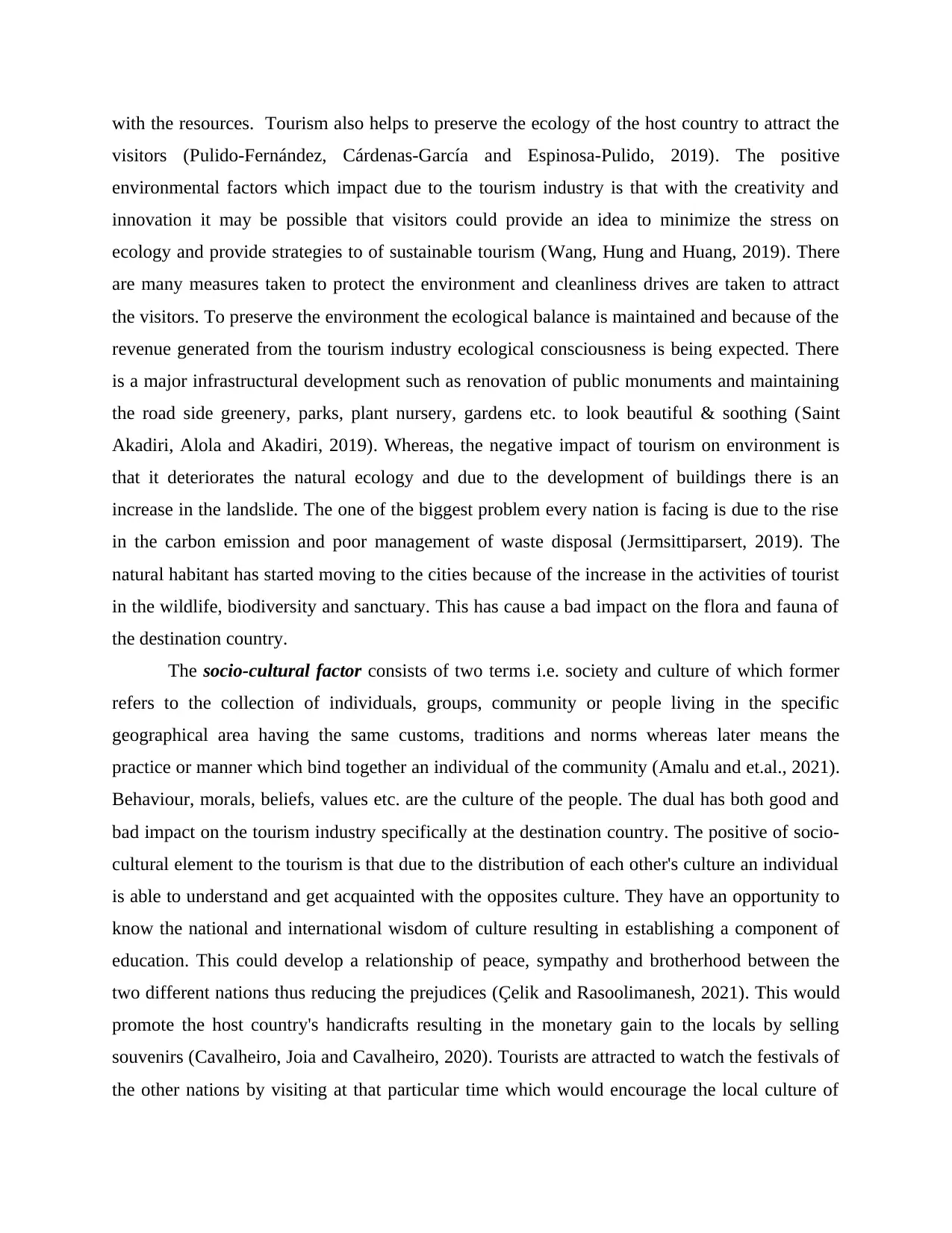
with the resources. Tourism also helps to preserve the ecology of the host country to attract the
visitors (Pulido-Fernández, Cárdenas-García and Espinosa-Pulido, 2019). The positive
environmental factors which impact due to the tourism industry is that with the creativity and
innovation it may be possible that visitors could provide an idea to minimize the stress on
ecology and provide strategies to of sustainable tourism (Wang, Hung and Huang, 2019). There
are many measures taken to protect the environment and cleanliness drives are taken to attract
the visitors. To preserve the environment the ecological balance is maintained and because of the
revenue generated from the tourism industry ecological consciousness is being expected. There
is a major infrastructural development such as renovation of public monuments and maintaining
the road side greenery, parks, plant nursery, gardens etc. to look beautiful & soothing (Saint
Akadiri, Alola and Akadiri, 2019). Whereas, the negative impact of tourism on environment is
that it deteriorates the natural ecology and due to the development of buildings there is an
increase in the landslide. The one of the biggest problem every nation is facing is due to the rise
in the carbon emission and poor management of waste disposal (Jermsittiparsert, 2019). The
natural habitant has started moving to the cities because of the increase in the activities of tourist
in the wildlife, biodiversity and sanctuary. This has cause a bad impact on the flora and fauna of
the destination country.
The socio-cultural factor consists of two terms i.e. society and culture of which former
refers to the collection of individuals, groups, community or people living in the specific
geographical area having the same customs, traditions and norms whereas later means the
practice or manner which bind together an individual of the community (Amalu and et.al., 2021).
Behaviour, morals, beliefs, values etc. are the culture of the people. The dual has both good and
bad impact on the tourism industry specifically at the destination country. The positive of socio-
cultural element to the tourism is that due to the distribution of each other's culture an individual
is able to understand and get acquainted with the opposites culture. They have an opportunity to
know the national and international wisdom of culture resulting in establishing a component of
education. This could develop a relationship of peace, sympathy and brotherhood between the
two different nations thus reducing the prejudices (Çelik and Rasoolimanesh, 2021). This would
promote the host country's handicrafts resulting in the monetary gain to the locals by selling
souvenirs (Cavalheiro, Joia and Cavalheiro, 2020). Tourists are attracted to watch the festivals of
the other nations by visiting at that particular time which would encourage the local culture of
visitors (Pulido-Fernández, Cárdenas-García and Espinosa-Pulido, 2019). The positive
environmental factors which impact due to the tourism industry is that with the creativity and
innovation it may be possible that visitors could provide an idea to minimize the stress on
ecology and provide strategies to of sustainable tourism (Wang, Hung and Huang, 2019). There
are many measures taken to protect the environment and cleanliness drives are taken to attract
the visitors. To preserve the environment the ecological balance is maintained and because of the
revenue generated from the tourism industry ecological consciousness is being expected. There
is a major infrastructural development such as renovation of public monuments and maintaining
the road side greenery, parks, plant nursery, gardens etc. to look beautiful & soothing (Saint
Akadiri, Alola and Akadiri, 2019). Whereas, the negative impact of tourism on environment is
that it deteriorates the natural ecology and due to the development of buildings there is an
increase in the landslide. The one of the biggest problem every nation is facing is due to the rise
in the carbon emission and poor management of waste disposal (Jermsittiparsert, 2019). The
natural habitant has started moving to the cities because of the increase in the activities of tourist
in the wildlife, biodiversity and sanctuary. This has cause a bad impact on the flora and fauna of
the destination country.
The socio-cultural factor consists of two terms i.e. society and culture of which former
refers to the collection of individuals, groups, community or people living in the specific
geographical area having the same customs, traditions and norms whereas later means the
practice or manner which bind together an individual of the community (Amalu and et.al., 2021).
Behaviour, morals, beliefs, values etc. are the culture of the people. The dual has both good and
bad impact on the tourism industry specifically at the destination country. The positive of socio-
cultural element to the tourism is that due to the distribution of each other's culture an individual
is able to understand and get acquainted with the opposites culture. They have an opportunity to
know the national and international wisdom of culture resulting in establishing a component of
education. This could develop a relationship of peace, sympathy and brotherhood between the
two different nations thus reducing the prejudices (Çelik and Rasoolimanesh, 2021). This would
promote the host country's handicrafts resulting in the monetary gain to the locals by selling
souvenirs (Cavalheiro, Joia and Cavalheiro, 2020). Tourists are attracted to watch the festivals of
the other nations by visiting at that particular time which would encourage the local culture of
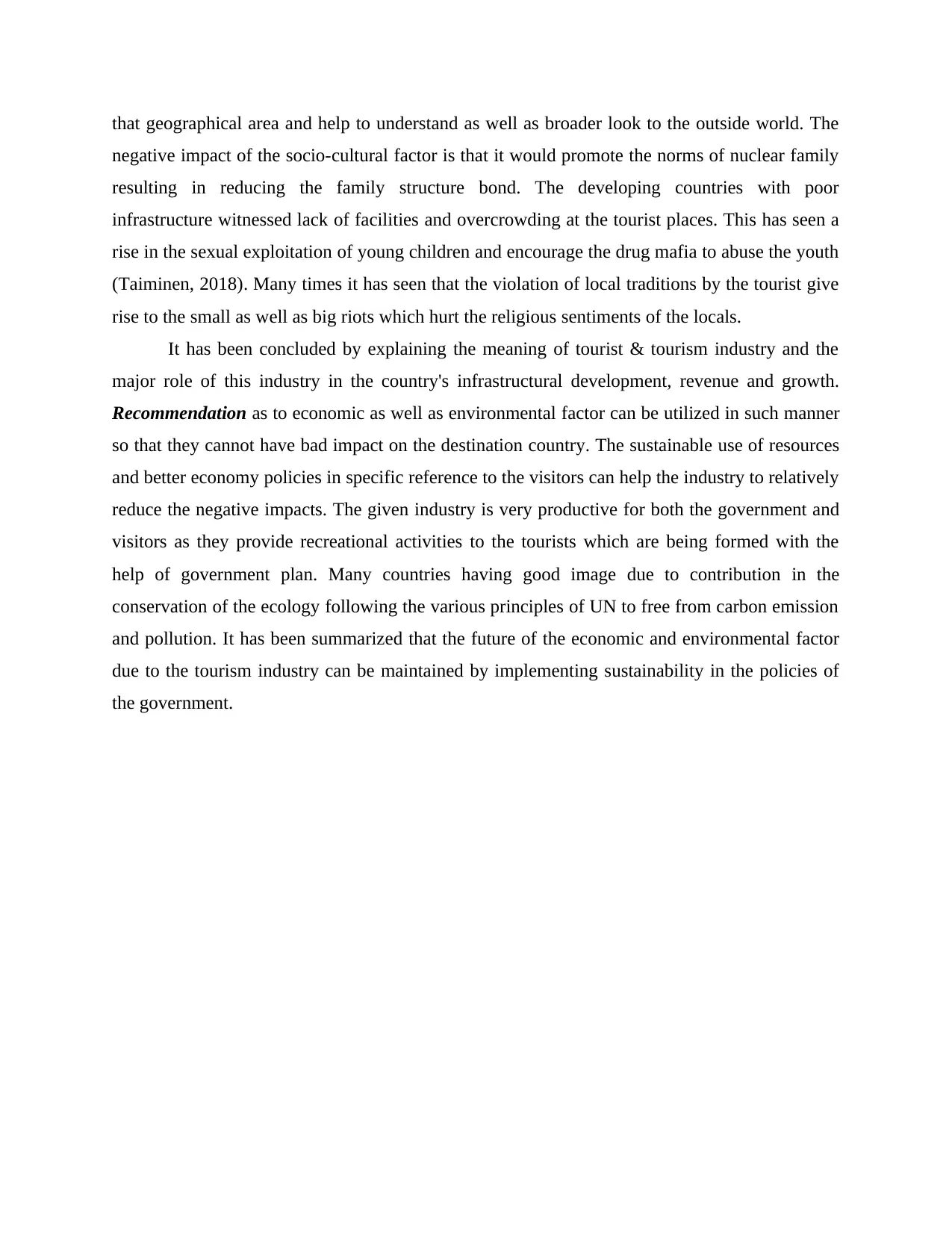
that geographical area and help to understand as well as broader look to the outside world. The
negative impact of the socio-cultural factor is that it would promote the norms of nuclear family
resulting in reducing the family structure bond. The developing countries with poor
infrastructure witnessed lack of facilities and overcrowding at the tourist places. This has seen a
rise in the sexual exploitation of young children and encourage the drug mafia to abuse the youth
(Taiminen, 2018). Many times it has seen that the violation of local traditions by the tourist give
rise to the small as well as big riots which hurt the religious sentiments of the locals.
It has been concluded by explaining the meaning of tourist & tourism industry and the
major role of this industry in the country's infrastructural development, revenue and growth.
Recommendation as to economic as well as environmental factor can be utilized in such manner
so that they cannot have bad impact on the destination country. The sustainable use of resources
and better economy policies in specific reference to the visitors can help the industry to relatively
reduce the negative impacts. The given industry is very productive for both the government and
visitors as they provide recreational activities to the tourists which are being formed with the
help of government plan. Many countries having good image due to contribution in the
conservation of the ecology following the various principles of UN to free from carbon emission
and pollution. It has been summarized that the future of the economic and environmental factor
due to the tourism industry can be maintained by implementing sustainability in the policies of
the government.
negative impact of the socio-cultural factor is that it would promote the norms of nuclear family
resulting in reducing the family structure bond. The developing countries with poor
infrastructure witnessed lack of facilities and overcrowding at the tourist places. This has seen a
rise in the sexual exploitation of young children and encourage the drug mafia to abuse the youth
(Taiminen, 2018). Many times it has seen that the violation of local traditions by the tourist give
rise to the small as well as big riots which hurt the religious sentiments of the locals.
It has been concluded by explaining the meaning of tourist & tourism industry and the
major role of this industry in the country's infrastructural development, revenue and growth.
Recommendation as to economic as well as environmental factor can be utilized in such manner
so that they cannot have bad impact on the destination country. The sustainable use of resources
and better economy policies in specific reference to the visitors can help the industry to relatively
reduce the negative impacts. The given industry is very productive for both the government and
visitors as they provide recreational activities to the tourists which are being formed with the
help of government plan. Many countries having good image due to contribution in the
conservation of the ecology following the various principles of UN to free from carbon emission
and pollution. It has been summarized that the future of the economic and environmental factor
due to the tourism industry can be maintained by implementing sustainability in the policies of
the government.
⊘ This is a preview!⊘
Do you want full access?
Subscribe today to unlock all pages.

Trusted by 1+ million students worldwide
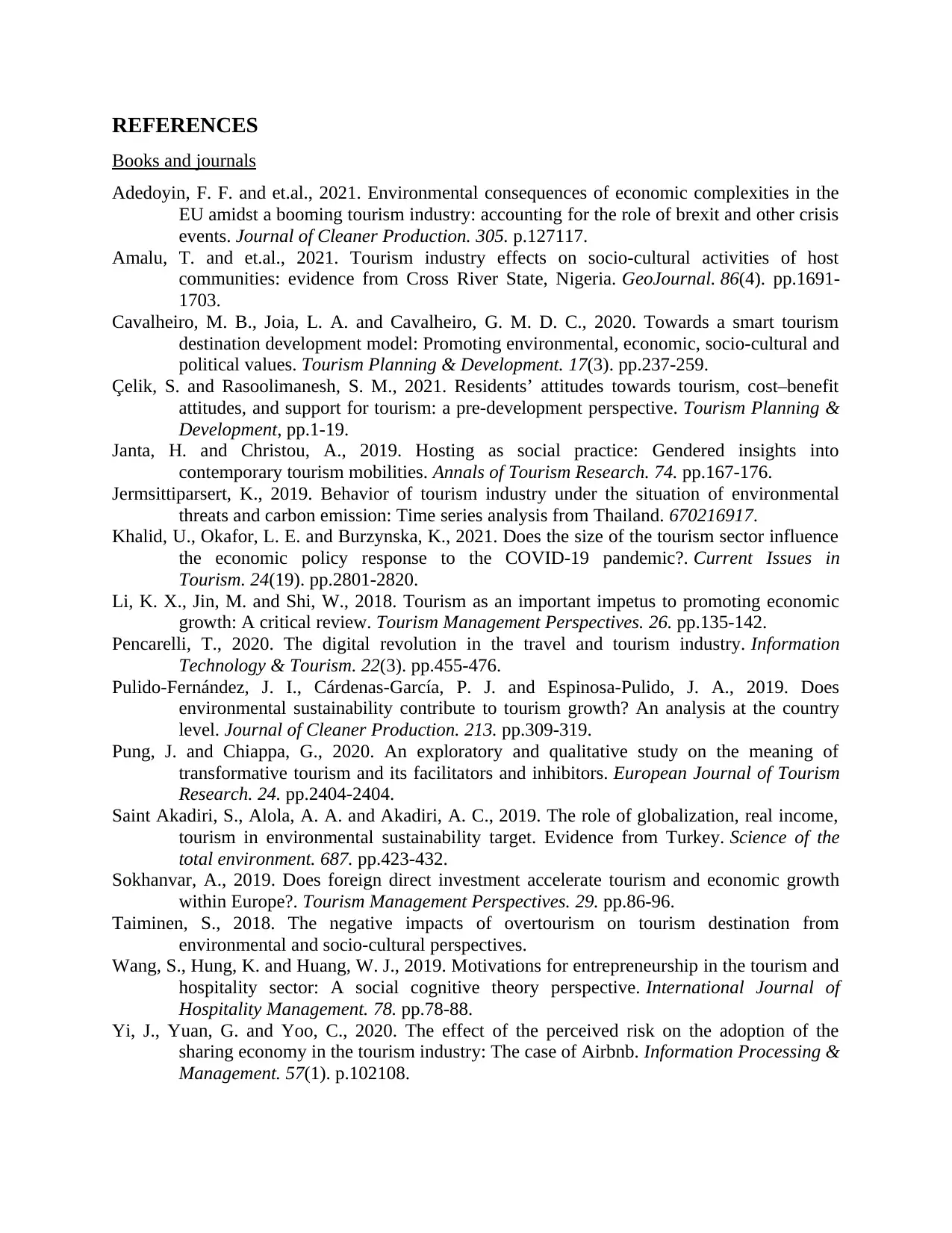
REFERENCES
Books and journals
Adedoyin, F. F. and et.al., 2021. Environmental consequences of economic complexities in the
EU amidst a booming tourism industry: accounting for the role of brexit and other crisis
events. Journal of Cleaner Production. 305. p.127117.
Amalu, T. and et.al., 2021. Tourism industry effects on socio-cultural activities of host
communities: evidence from Cross River State, Nigeria. GeoJournal. 86(4). pp.1691-
1703.
Cavalheiro, M. B., Joia, L. A. and Cavalheiro, G. M. D. C., 2020. Towards a smart tourism
destination development model: Promoting environmental, economic, socio-cultural and
political values. Tourism Planning & Development. 17(3). pp.237-259.
Çelik, S. and Rasoolimanesh, S. M., 2021. Residents’ attitudes towards tourism, cost–benefit
attitudes, and support for tourism: a pre-development perspective. Tourism Planning &
Development, pp.1-19.
Janta, H. and Christou, A., 2019. Hosting as social practice: Gendered insights into
contemporary tourism mobilities. Annals of Tourism Research. 74. pp.167-176.
Jermsittiparsert, K., 2019. Behavior of tourism industry under the situation of environmental
threats and carbon emission: Time series analysis from Thailand. 670216917.
Khalid, U., Okafor, L. E. and Burzynska, K., 2021. Does the size of the tourism sector influence
the economic policy response to the COVID-19 pandemic?. Current Issues in
Tourism. 24(19). pp.2801-2820.
Li, K. X., Jin, M. and Shi, W., 2018. Tourism as an important impetus to promoting economic
growth: A critical review. Tourism Management Perspectives. 26. pp.135-142.
Pencarelli, T., 2020. The digital revolution in the travel and tourism industry. Information
Technology & Tourism. 22(3). pp.455-476.
Pulido-Fernández, J. I., Cárdenas-García, P. J. and Espinosa-Pulido, J. A., 2019. Does
environmental sustainability contribute to tourism growth? An analysis at the country
level. Journal of Cleaner Production. 213. pp.309-319.
Pung, J. and Chiappa, G., 2020. An exploratory and qualitative study on the meaning of
transformative tourism and its facilitators and inhibitors. European Journal of Tourism
Research. 24. pp.2404-2404.
Saint Akadiri, S., Alola, A. A. and Akadiri, A. C., 2019. The role of globalization, real income,
tourism in environmental sustainability target. Evidence from Turkey. Science of the
total environment. 687. pp.423-432.
Sokhanvar, A., 2019. Does foreign direct investment accelerate tourism and economic growth
within Europe?. Tourism Management Perspectives. 29. pp.86-96.
Taiminen, S., 2018. The negative impacts of overtourism on tourism destination from
environmental and socio-cultural perspectives.
Wang, S., Hung, K. and Huang, W. J., 2019. Motivations for entrepreneurship in the tourism and
hospitality sector: A social cognitive theory perspective. International Journal of
Hospitality Management. 78. pp.78-88.
Yi, J., Yuan, G. and Yoo, C., 2020. The effect of the perceived risk on the adoption of the
sharing economy in the tourism industry: The case of Airbnb. Information Processing &
Management. 57(1). p.102108.
Books and journals
Adedoyin, F. F. and et.al., 2021. Environmental consequences of economic complexities in the
EU amidst a booming tourism industry: accounting for the role of brexit and other crisis
events. Journal of Cleaner Production. 305. p.127117.
Amalu, T. and et.al., 2021. Tourism industry effects on socio-cultural activities of host
communities: evidence from Cross River State, Nigeria. GeoJournal. 86(4). pp.1691-
1703.
Cavalheiro, M. B., Joia, L. A. and Cavalheiro, G. M. D. C., 2020. Towards a smart tourism
destination development model: Promoting environmental, economic, socio-cultural and
political values. Tourism Planning & Development. 17(3). pp.237-259.
Çelik, S. and Rasoolimanesh, S. M., 2021. Residents’ attitudes towards tourism, cost–benefit
attitudes, and support for tourism: a pre-development perspective. Tourism Planning &
Development, pp.1-19.
Janta, H. and Christou, A., 2019. Hosting as social practice: Gendered insights into
contemporary tourism mobilities. Annals of Tourism Research. 74. pp.167-176.
Jermsittiparsert, K., 2019. Behavior of tourism industry under the situation of environmental
threats and carbon emission: Time series analysis from Thailand. 670216917.
Khalid, U., Okafor, L. E. and Burzynska, K., 2021. Does the size of the tourism sector influence
the economic policy response to the COVID-19 pandemic?. Current Issues in
Tourism. 24(19). pp.2801-2820.
Li, K. X., Jin, M. and Shi, W., 2018. Tourism as an important impetus to promoting economic
growth: A critical review. Tourism Management Perspectives. 26. pp.135-142.
Pencarelli, T., 2020. The digital revolution in the travel and tourism industry. Information
Technology & Tourism. 22(3). pp.455-476.
Pulido-Fernández, J. I., Cárdenas-García, P. J. and Espinosa-Pulido, J. A., 2019. Does
environmental sustainability contribute to tourism growth? An analysis at the country
level. Journal of Cleaner Production. 213. pp.309-319.
Pung, J. and Chiappa, G., 2020. An exploratory and qualitative study on the meaning of
transformative tourism and its facilitators and inhibitors. European Journal of Tourism
Research. 24. pp.2404-2404.
Saint Akadiri, S., Alola, A. A. and Akadiri, A. C., 2019. The role of globalization, real income,
tourism in environmental sustainability target. Evidence from Turkey. Science of the
total environment. 687. pp.423-432.
Sokhanvar, A., 2019. Does foreign direct investment accelerate tourism and economic growth
within Europe?. Tourism Management Perspectives. 29. pp.86-96.
Taiminen, S., 2018. The negative impacts of overtourism on tourism destination from
environmental and socio-cultural perspectives.
Wang, S., Hung, K. and Huang, W. J., 2019. Motivations for entrepreneurship in the tourism and
hospitality sector: A social cognitive theory perspective. International Journal of
Hospitality Management. 78. pp.78-88.
Yi, J., Yuan, G. and Yoo, C., 2020. The effect of the perceived risk on the adoption of the
sharing economy in the tourism industry: The case of Airbnb. Information Processing &
Management. 57(1). p.102108.
Paraphrase This Document
Need a fresh take? Get an instant paraphrase of this document with our AI Paraphraser
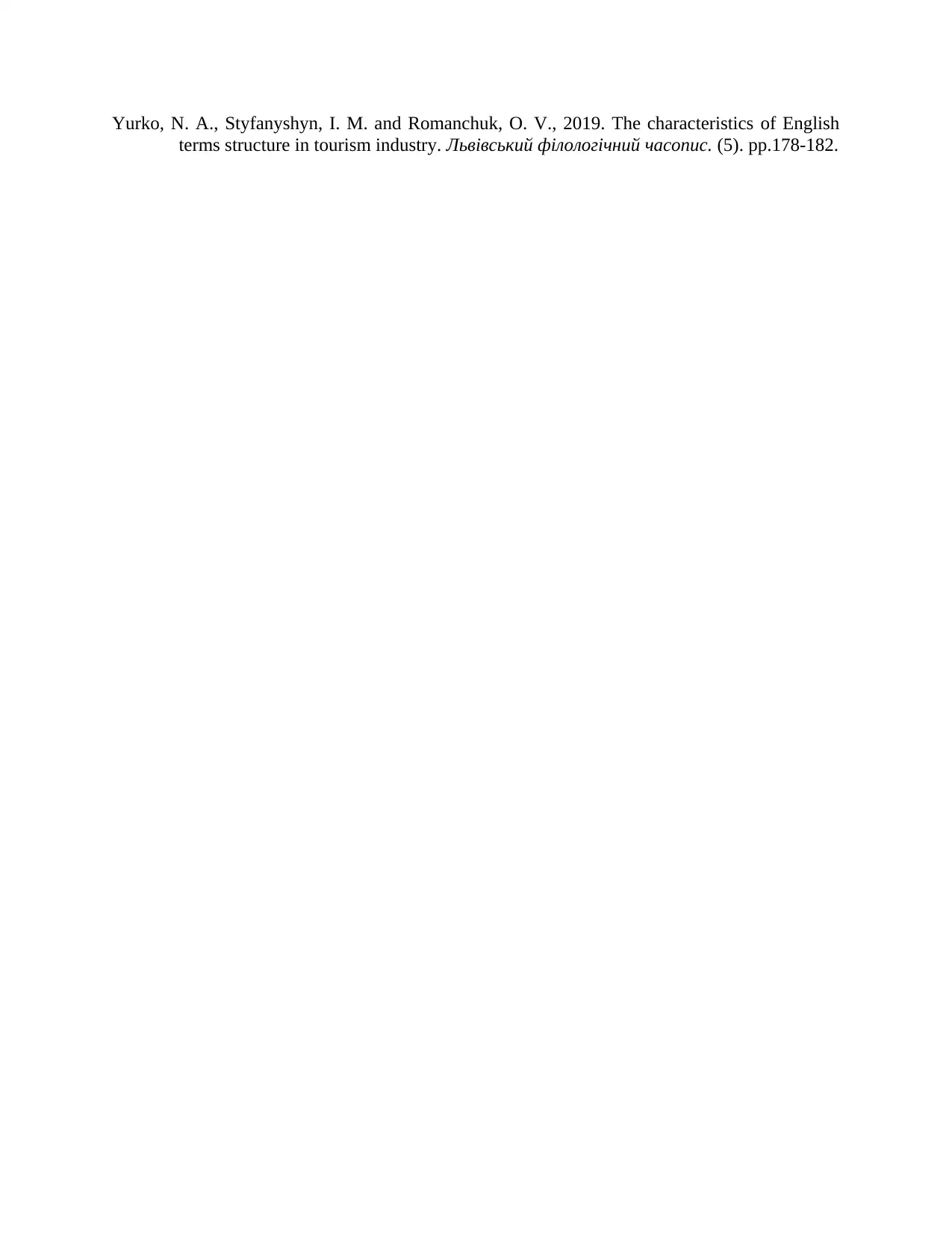
Yurko, N. A., Styfanyshyn, I. M. and Romanchuk, O. V., 2019. The characteristics of English
terms structure in tourism industry. Львівський філологічний часопис. (5). pp.178-182.
terms structure in tourism industry. Львівський філологічний часопис. (5). pp.178-182.
1 out of 8
Related Documents
Your All-in-One AI-Powered Toolkit for Academic Success.
+13062052269
info@desklib.com
Available 24*7 on WhatsApp / Email
![[object Object]](/_next/static/media/star-bottom.7253800d.svg)
Unlock your academic potential
Copyright © 2020–2026 A2Z Services. All Rights Reserved. Developed and managed by ZUCOL.

